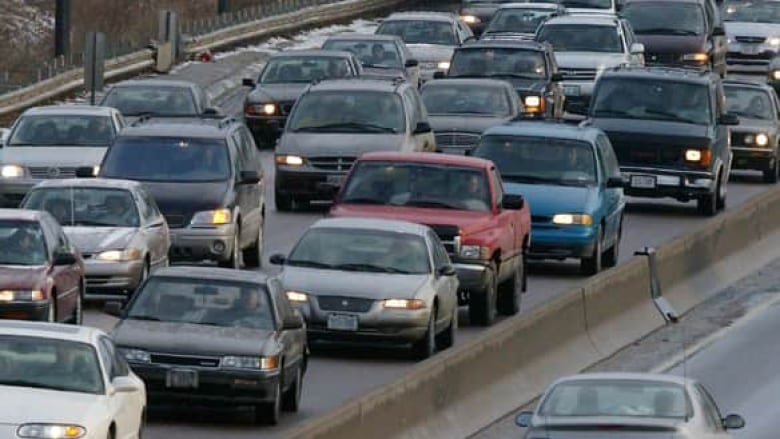Pan-Am officials want local traffic cut 20% during Games
Plan for temporary car pool lanes 'absolutely unrealistic' says Tory critic
Pan-Am Games officials are hoping to reduce local traffic by 20 per cent when Toronto hosts the Games in 2015 in an effort to keep the region — already struggling with gridlock — in a "normal" state during the Games.
Officials said Friday that temporary lanes for high-occupancy vehicles will span Ontario’s Golden Horseshoe region, so that athletes, coaches and the media can more easily move between the Games locations.
The plan calls for a 150-kilometre-long network of high-occupancy vehicle lanes from Hamilton to Oshawa, incorporating existing HOV lanes on the Queen Elizabeth Way and Highway 404.
- Pan-Am Games security now expected to cost $239M
- Pan-Am Games costs edging up, opposition warns
- Toronto 2015 Pan-Am Games
Local drivers will meanwhile be encouraged to use public transit.
"Based on best practices of past games, we are very confident that this 20 per cent target is achievable," said Tourism and Sport Minister Michael Chan, adding that Vancouver and London managed to cut traffic by 30 to 40 per cent during their recent Olympic Games.
Among the details:
- Priority lanes will be made available to car poolers and transit buses. These lanes would move athletes, coaches, officials and members of the media.
- The government will encourage residents to use transit as much as possible in an effort to reduce gridlock while the Games are underway.
- There may also be restrictions on parking and road work during the Games, which take place July 10 to 26.
- There may be priority lanes on Lakeshore Boulevard and Jarvis Street downtown.
- Other dedicated lanes will be put in place on highways around the city, including the Don Valley Parkway and Highway 401.
- An $81 million private security contract has been awarded to Contemporary Security Canada. Guards will not have policing powers.
But critics among the Progressive Conservatives said "it's absolutely unrealistic" to plan for less traffic when 250,000 visitors are expected to attend the Games, along with 10,000 athletes and officials, 20,000 volunteers and 4,400 accredited media.

"It's actually naive and frankly somewhat absurd to think that there's going to be a 20 per cent decrease based on the hope that people will do the right thing and stay out of their cars."
The transportation budget for the Games is $75 million to $90 million. By comparison, the Vancouver Winter Games cost $173.5 million.
The news comes after it was revealed earlier this month that overall security costs for hosting Games have ballooned to $239 million from a 2009 estimate of $206 million. The $239-million figure includes the private security contract plus the cost of the Ontario Provincial Police and local police forces and their overtime.
With files from Canadian Press
